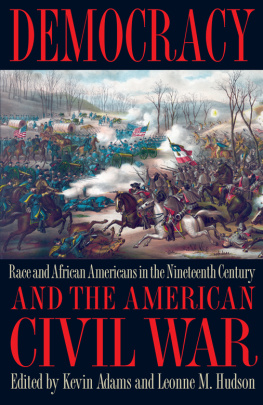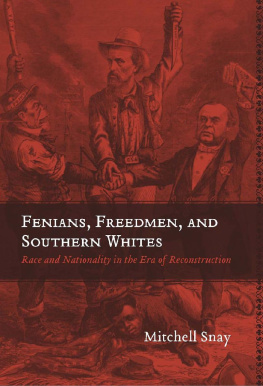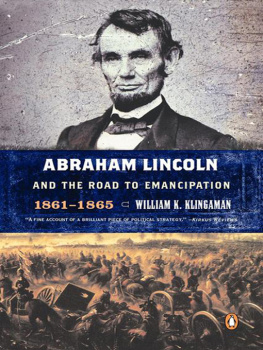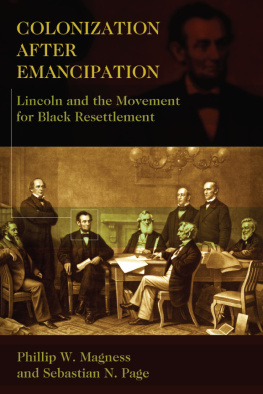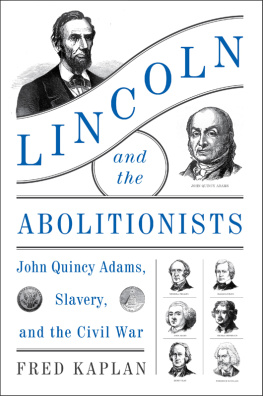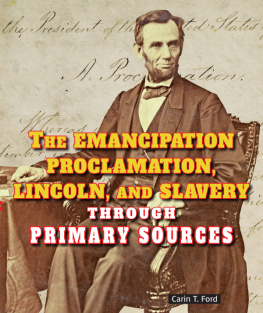
Praise for Democracy and the American Civil War
It is unfortunate that Alexis de Tocqueville died in 1859. His Democracy in America of 1835 was one of the most brilliant examinations of any society at any time in human history. What would he have thought about the American Civil War and the presidency of Abraham Lincoln? We will never know. Thankfully, this new volume, superbly edited by Kevin Adams and Leonne M. Hudson, draws us into the varied and vexed worlds of democracy during the nations most grueling test with Tocquevillian talent. Any reader who wants to wrestle with democracy, race, and the Civil War will grab this volume.
EDWARD J. BLUM, author of Reforging the White Republic:
Race, Religion, and American Nationalism, 18651898
At Gettysburg, Abraham Lincoln emphasized a new birth of freedom for government of, by, and for the people (and that is the proposition he emphasized as he spoke, not the prepositions). The Civil War changed American democracy and American race relations in ways sweeping and subtle. From abolitionists and black troops to the Cherokee, from changing laws to growing lawlessness, this marvelous collection of essays examines ways in which Americans of the Civil War era triedand sometimes failedto live up to the ideals that Lincoln described, and gives us new ways to think about the times and the people at the heart of them.
MICHAEL S. GREEN, author of Lincoln and the Election of 1860
This slender volume illustrates that for all the recent work on emancipation during the Civil War era, imaginative scholars still draw fresh insights. Its coverage spans abolitionism, Abraham Lincoln, emancipation in the Cherokee Nation, the White Leagues in Reconstruction Louisiana, and the principle of posse comitatus. The relationship of race to democracy runs through all the essays. It is fitting that Kent State Universitys annual Symposium on Democracy, commemorating the events there in May 1970, sponsored these explorations. The contributors pay fitting tribute to the quest for a fuller and more inclusive democracy that each generation enriches with its blood.
JOSEPH P. REIDY, Professor of History and
Associate Provost, Howard University
Reflections of the work and wisdom of five leading historians, the essays in this welcome volume probe and explain the most explosive racial controversies of the Civil War era: militant abolitionism, wartime emancipation, proud black soldiers, postwar Union military occupation, white resistance to Reconstruction, and the plague of ongoing racism. Together, they prove that American democracys long quest for racial justice almost inevitably requires force and provokes violence.
T. MICHAEL PARRISH, Baylor University
Democracy and the
American Civil War
Democracy and the
American Civil War

Race and African Americans
in the Nineteenth Century

EDITED BY
KEVIN ADAMS
AND
LEONNE M. HUDSON
THE KENT STATE UNIVERSITY PRESS
KENT, OHIO
2016 by The Kent State University Press, Kent, Ohio 44242
ALL RIGHTS RESERVED
ISBN 978-1-60635-269-4
Manufactured in the United States of America
Portions of chapter 1 originally appeared in A Companion to the U.S. Civil War, edited by Aaron Sheehan-Dean, 2014 John Wiley & Sons, Inc. Used by permission of John Wiley & Sons, Inc.
Portions of chapter 3 originally appeared on pages 7492 of Race and the Cherokee Nation: Sovereignty in the Nineteenth Century by Fay A. Yarbrough, Copyright 2008 University of Pennsylvania Press.
Reprinted with permission of the University of Pennsylvania Press.
Cataloging information for this title is available at the Library of Congress.
20 19 18 17 16 5 4 3 2 1
Contents
It is only proper that we pause to recognize and acknowledge those persons who played a role in the success of the Symposium on Democracy and the publication of the book that followed. The planning for the symposium and the publication of the subsequent volume required the help and cooperation of several individuals. The members of the symposium planning committee would like to express their sincere gratitude to Lester A. Lefton, then president of Kent State University. His support for the symposium helped to guarantee its success. President Lefton fully understood that a university is a microcosm of society, in which democratic principles must be valued and protected. We also offer special thanks to Debra L. Berry of the presidents office, who guided us around pitfalls and kept us on track without a word of complaint. When we found ourselves facing an uncertainty, Debra could always be counted on to provide calm and encouragement.
The work of the symposium planning committee was significantly eased by the outstanding support it received from Kent State Universitys Office of University Communications and Marketing, the Kent Student Center, the Department of History, the May 4 Visitors Center, and the Kent State University Bookstore. We would also like to thank the keynote speaker, panelists, and moderators of the sessions for their significant contributions to the program. The panel moderators, Lesley J. Gordon of the University of Akron and Kevin Adams and Leonne M. Hudson, both of Kent State University, added an important scholarly dimension to the symposium. We also extend a special note of appreciation to KSUs faculty, students, and staff, and to members of the community, for their support of and attendance at all or portions of the symposium.
The Kent State University Press supported the symposium project from the beginning and remained an invaluable resource throughout the planning process. The editors of this volume are especially indebted to Will Underwood, KSUPs director, and Joyce Harrison, its acquiring editor, for their commitment to the publication of these essays. We would like to thank the staff at the Press for making certain that this volume is a reflection of the high quality for which KSUP is known. We are grateful to the readers of this manuscript, Joseph P. Reidy and the other, anonymous, reader, for offering substantial suggestions for improving this work.
It is our hope that this volume will generate discourse on college and university campuses on the significance of tolerance, inclusion, and pluralism in a democratic nation.
The first May 4 Symposium on Democracy was held at Kent State University in April 2000. Carol A. Cartwright, then president of the university, established the symposium as a forum for scholarly discussion on the meaning of democracy in a pluralistic society. Through the symposium, the university emphasizes the promotion of civil discourse and the prevention of violent confrontations. Among the cornerstones of a democratic society are freedom of speech and freedom of assembly. If these are in any way circumscribed, America is diminished as a nation. By embracing the horrific events of May 4, 1970, Kent State University acknowledges in a very public way the unforgettable tragedy that occurred on its campus decades ago. The symposium also honors the memory of the four students who lost their lives on that dayAllison Krause, Jeffrey Miller, Sandra Scheuer, and William Schroederand of the nine others who were wounded when Ohio National Guardsmen opened fire on students protesting the war in Vietnam.

